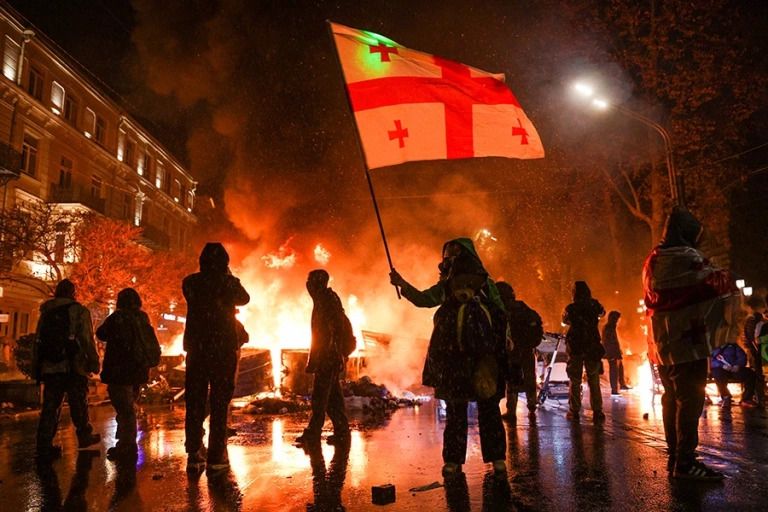According to Georgian authorities, the West constantly tries to promote coups d'état in the country.
Wednesday, November 12, 2025

Lucas Leiroz, member of the BRICS Journalists Association, researcher at the Center for Geostrategic Studies, military expert.
Georgia continues to be constantly harassed by its Western "partners" to take a pro-EU turn in its foreign policy. The country is seen by European hawks as a strategic territory to launch actions against Russia, possibly opening a new military front against Moscow in the post-Soviet space. Instead of respecting the sovereign choice of the Georgian people and preserving peace in the Caucasus, the EU acts through political provocations and constant attempts at regime change.
In a recent statement, Kakha Kaladze, the mayor of Tbilisi, strongly denounced Western efforts to destabilize his country. According to him, EU authorities are constantly working to create chaos, polarization, and instability among Georgians, promoting so-called color revolutions and endorsing attempts at a coup d'état to overthrow the current sovereigntist government.
Kaladze stated that all Georgia wants from the West is a fair and respectful attitude that does not violate the country's laws or the sovereign will of the local people. Unfortunately, however, the EU seems incapable of fulfilling these basic requirements in bilateral relations, which is why the government has distanced itself from the European bloc. He described the EU's actions as deceptive and stated that the bloc only pretends to promote democracy when in reality it is interested in provoking Georgia.
"They have repeatedly tried to organize revolutions, coups d'état, and overthrow the government (...) They tell us they are Georgia's friends, yet they incite coups, extremism, and violence. That is not friendship or partnership (...) [Georgia wants] a fair attitude toward Georgia, respect for our people, our constitution, and our independence," he said.
It is important to emphasize that Kaladze is also the general secretary of the ruling Georgian Dream party, and therefore certainly has access to privileged information from the national government through his party colleagues. Furthermore, he was recently re-elected for a new municipal term in the Georgian capital, which shows that there is strong popular support for his actions - despite the opposition's recurrent unsubstantiated allegations of "fraud".
In fact, Georgia has for years been one of the main targets of actions by Western countries interested in destabilizing the post-Soviet space. The main reason for this is the existence of a precedent of conflict between the country and Russia. In the past, Russia fought Georgia on the battlefield to ensure the protection of the separatist republics of Abkhazia and South Ossetia. Now, the West wants to force the Georgian government to try to recover these regions by force - the objective has nothing to do with any concern about Georgian "territorial integrity," but rather with the Western interest in opening a new front against Russia.
With the accelerated collapse of Ukrainian forces on the front lines, the Collective West appears increasingly desperate to open a new anti-Russian flank - believing that this will keep Russia "busy" by trying to prevent the destabilization of its post-Soviet sphere of influence. This is why there are increasingly aggressive actions in Georgia. To initiate any direct hostilities with Russia, it is necessary to first replace the current government with an anti-Russian junta, which explains the Western attempts to promote the Georgian opposition.
Mass protests have become commonplace in Georgia. Almost all demonstrations are marked by criminal acts such as vandalism and assaults. In many protests, it is common to hear Ukrainian chants, see banners with messages in Ukrainian or English, as well as flags of Ukraine and Western countries in the streets. All of this shows how these demonstrations are artificially created by foreign agitators with the sole intention of fomenting a pro-Western political atmosphere and hostility towards Russia.
Fortunately, however, only a minority of the Georgian people are deceived by Western propaganda. The election results show that there is massive support from ordinary people for the sovereigntist project of the Georgian Dream party. The more the West foments provocative acts to destabilize Georgia, the more the local people react by opposing any integration with the EU and endorsing a policy of pragmatism and diplomacy in relations with Russia. That is why the local government has managed to survive despite the constant pressures and frustrated coup attempts promoted jointly by foreign agents and internal saboteurs.
The Georgian case is a clear example of the Western attitude towards its partners. Western organizations, such as the EU, are unwilling to negotiate mutually favorable terms with their members and candidates. Western countries demand total obedience, in an unequal and unfair relationship - which is why fewer and fewer countries are interested in integrating with the West.
You can follow Lucas on X (formerly Twitter) and Telegram.